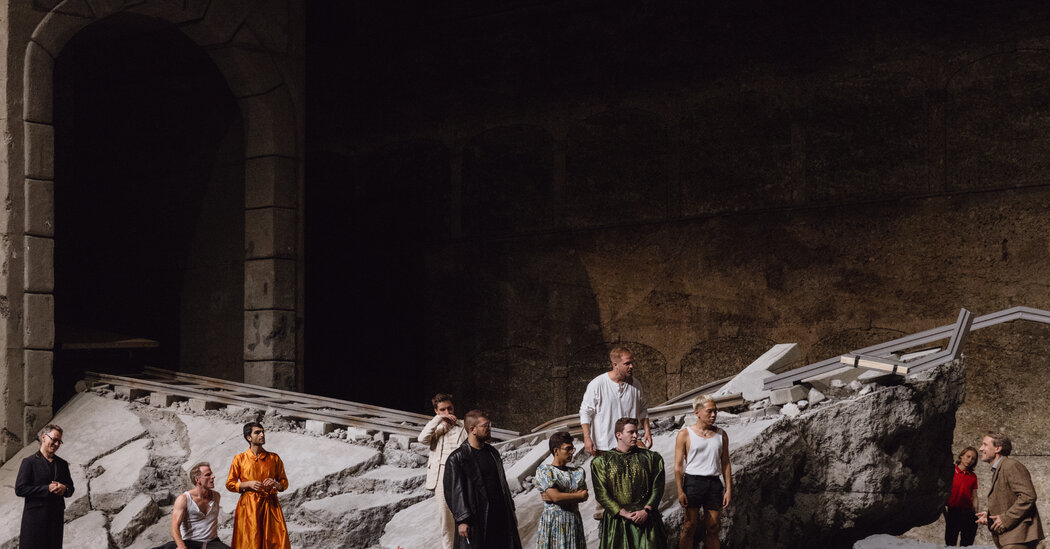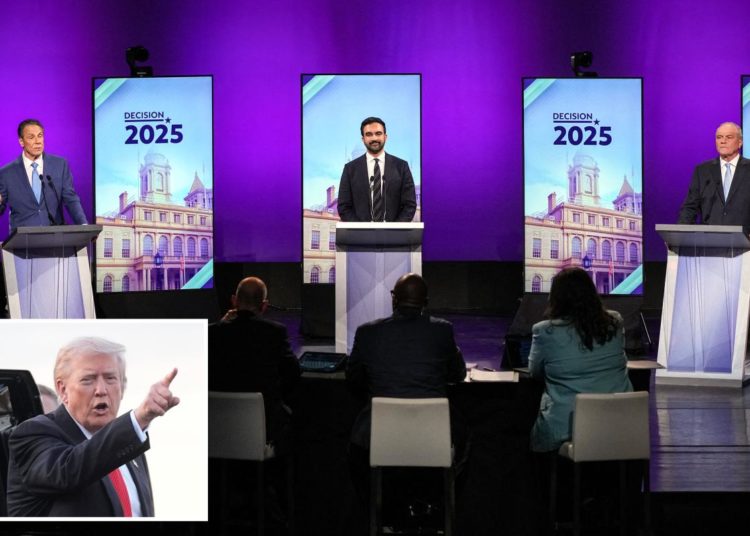On a hot, drizzly afternoon in late June, a rehearsal of Peter Eotvos’s “Three Sisters,” one of the four new opera productions at this summer’s Salzburg Festival, erupted in dainty tinkling.
The opera’s cast members sat in the middle of a rehearsal room and tapped spoons against empty teacups. The conductor Maxime Pascal, flanked by two pianos, nodded approvingly at the sounds of clinking, clattering and rattling. On the large copy of the score that lay in front of him, each tap was precisely notated, and there was a visual key illustrating different techniques: tapping with the tip or the stem of a teaspoon, continuous stirring, and setting a spoon down on a saucer.
“Peter wrote this moment because it’s a bit boring,” Pascal explained with a slight chuckle during a break in the rehearsal. “The three sisters are very bored, and there is this kind of melancholy.”
Based on Anton Chekhov’s 1900 play about siblings in a Russian provincial town who dream of a better, more fulfilling life in Moscow, the opera is unconventional in ways that are, by turns, playful and daring.
The four main female characters — Olga, Masha and Irina as well as their sister-in-law, Natasha — are performed by countertenors, the highest male voice type. In addition to china and cutlery, the score calls for two musical groups: a pit band (referred to as the ensemble) of 18 instruments that are identified with specific characters, and a 50-piece orchestra that plays from elsewhere in the theater. (For the Salzburg performances, the orchestra will play from a large hidden balcony that is behind and above the rows of seating in the Felsenreitschule, a cavernous indoor theater that is carved into a cliff.)
Pascal compared the role of the orchestra, which is amplified, to that of a film soundtrack. “You hear the singers in front of you, and the ensemble in front of you with all this psychologic writing, and there is this sound landscape all around the audience,” he said.
But granular details, like the precisely notated spoon-tapping scene, are equally critical. “There is a choreography and a sound choreography,” Pascal said. “It’s written directly into the score by Peter Eotvos.”
Eotvos, a Hungarian composer who died last year at 80, was frequently drawn to literary works. “Three Sisters,” sung in Russian, was the first of five full-length operas that he wrote and remains his best-known — and most frequently performed — work in the genre.
In adapting Chekhov’s play, Eotvos and his co-librettist, Claus H. Henneberg, reshuffled its scenes, presenting the characters’ relationships and conflicts in a condensed form. Each of the opera’s three acts is told from the perspective of a different character. “It’s a kind of kaleidoscopic organization and structure,” Pascal explained, adding that each of the 26 scenes is “a kind of photography of a moment.”
Since its world premiere in Lyon, France, in 1998, “Three Sisters” has been performed throughout Europe and Russia, and even in Argentina — although not yet in the United States. At Salzburg this summer, it takes its place alongside other major 20th-century operas that have graced recent programs, including Aribert Reimann’s “Lear,” Hans Werner Henze’s “The Bassarids,” and Georges Enescu’s “Oedipe.”
Markus Hinterhäuser, the Salzburg Festival’s artistic director, said that mounting “Three Sisters” here had been a longstanding ambition for him.
“I saw one of the first performances a very long time ago in Vienna and was totally fascinated,” he said in an interview in his office. From the wall above his desk, a large photograph of the 20th-century Italian composer Luigi Nono, whose “Intolleranza 1960” Hinterhäuser programmed in 2021, stared down at us.
The program that Hinterhäuser has curated for this year can’t help looking a bit grim. It reflects the bleakness of the times we live in, the sense of futility and loss of control that so many people feel in the face of political turmoil, economic precarity and war. Three of the other operas headlining the festival — Handel’s “Giulio Cesare in Egitto,” Donizetti’s “Maria Stuarda” and Verdi’s “Macbeth” — are concerned with the vicissitudes and machinations of power. “Three Sisters” offers a much more intimate view of collapse, from the perspective of its unfulfilled main characters.
“They’re ‘waiting for the miracle; there’s nothing left to do,’” Hinterhäuser said, quoting Leonard Cohen, one of his heroes.
“They’re waiting in a state and situation with an incredible loss of dreams, of wishes, of hopes,” he added, noting that Chekhov and Eotvos allowed for the possibility of consolation. “It will happen someday. There is this utopia. We just have to be aware that it will happen.”
Onstage in the Felsenreitschule the finishing touches were being put on the monumental set by Rufus Didwiszus, which is dominated by a blown-up train track leading into a tunnel. It’s a stark image that takes advantage of the extra-wide stage and harmonizes with the rock architecture of the venue.
“I try to create a special, unique world,” said Evgeny Titov, the production’s director, adding that this “Three Sisters” is neither fully set in present day nor in Chekhov’s time. Even so, he conceded that it was impossible for current events not to leave their mark on his production.
“The way to Moscow is not possible anymore because of the context in which we are living, because of war,” Titov said. His explained that his staging was meant to provoke reflection, not point fingers.
“It should wake up your thoughts, but it’s not in good taste if it’s just written on the wall — Russia or Ukraine or whatever,” said Titov, who was born in Kazakhstan when it was still a republic of the Soviet Union. Speaking in a soundproof hallway next to the room where rehearsals were underway, Titov explained that he was more interested in teasing out the work’s existential themes of departure and arrival and where our desires and hopes lead us.
“It’s all in the play,” he said, adding that with a work this complex and concentrated, any messaging or allusions to current events must be subtle.
“It has to be like sugar in the tea,” he said. “It should be melted.”
Aryeh Nussbaum Cohen, an American countertenor, sings Olga, the eldest sister. “The piece is this amazing sort of marination on the nature of human suffering and still clinging to some hope and it feels very, very apt to be performing it right now,” he said.
It’s a dramatically and musically challenging part — and in Russian, not a language with much repertoire for countertenors. Eotvos’s score was an expert guide for digging into the character, Nussbaum Cohen said.
“I work a lot with modern opera,” he said, “and sometimes you feel there are pieces where the technical difficulty doesn’t always serve the storytelling. Sometimes it can feel as though composers are making things difficult for difficulty’s sake, in a sense, or just sort of pushing the boundaries of what is musically possible without it always being driven by the drama.”
With “Three Sisters,” however, Nussbaum Cohen found that “the sound world matches the emotional world that we’re in, sort of to a T.”
“A more sort of conventional musical language,” he continued, “just wouldn’t serve the story nearly as well.”
The post At Salzburg, a Modern Opera About Timeless Dreams and Realities appeared first on New York Times.




